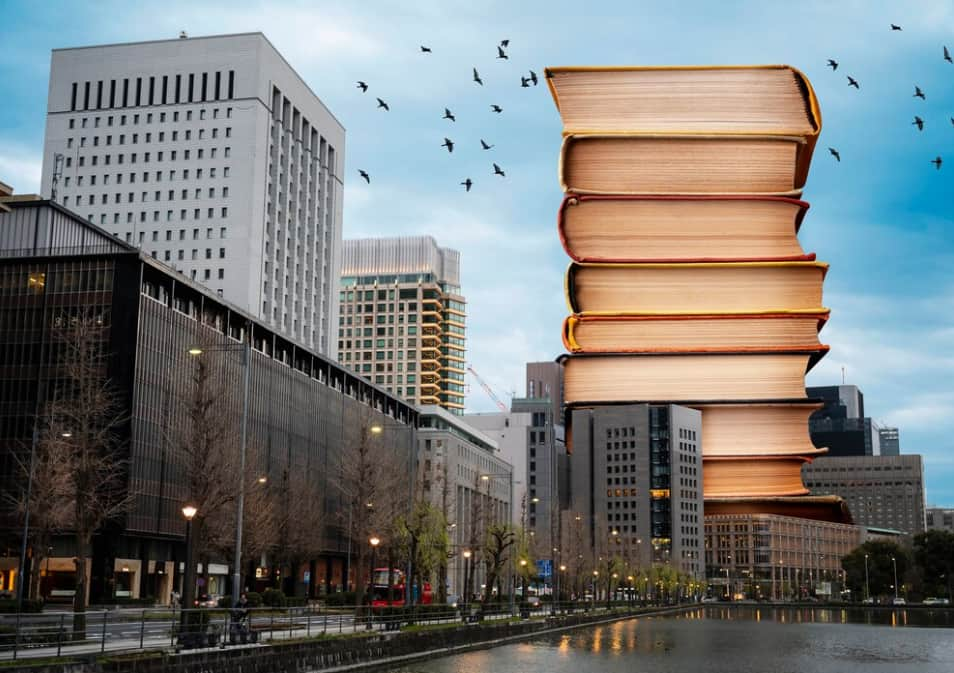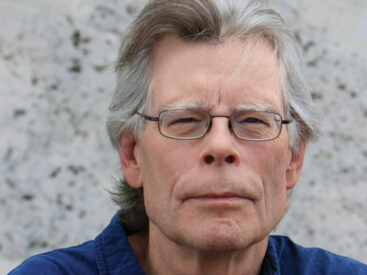The top 27 Utopia books, each appearing on three or more lists, have been aggregated and ranked below, complete with brief summaries, images, and links. The page also includes the additional 215 books and the sources used, listed in alphabetical order at the end.
Exploring the top utopian books of all time gives us a glimpse into ideal societies, and if you’re interested in unique narratives with a twist of humor, you may also like the works of Christopher Moore, known for his satirical and imaginative storytelling.
27 of the Best Utopian Books
Always Coming Home by Ursula K. Le Guin
“Always Coming Home” by Ursula K. Le Guin is a distinctive and imaginative creation from one of America’s acclaimed science fiction authors. This novel, which took over five years to complete, is unique in its genre. It masterfully combines a variety of elements such as stories, fables, poems, artwork, and music. The book transports readers into the world of the Kesh, a peaceful society in the distant future living in the Valley along the Northern Pacific Coast.
Christianopolis by Johann Valentin Andreae
“Christianopolis” by Johann Valentin Andreae is another notable work listed under both Utopian and Dystopian Fiction. This work is recognized for its contribution to the genre of utopian literature.
Lost Horizon by James Hilton
James Hilton’s “Lost Horizon” appears on several lists, including Best Science Fiction Books and Utopian Fiction. Known as a classic utopian adventure novel, it introduces readers to the mythical haven of Shangri-La.
The City of the Sun by Tommaso Campanella
“The City of the Sun” by Tommaso Campanella, first published in 1602, stands out as a philosophical and utopian work. It is formatted as a dialogue and draws inspiration from Plato’s “Republic” and the description of Atlantis in “Timaeus.” This book envisages a theocratic society where resources, including goods, women, and children, are communal. It also bears resemblance to the City of Adocentyn from the Arabic grimoire of astrological magic, “Picatrix.”
The Giver by Lois Lowry
“The Giver” by Lois Lowry, a recipient of the 1994 Newbery Medal, is widely recognized as a profoundly influential novel in modern literature. The story is set around the life of twelve-year-old Jonas, who inhabits a world that initially seems perfectly harmonious and uniform, but lacks any depth of color or emotion. His perspective starts to shift dramatically when he is appointed as the Receiver of Memory, a role that unveils the troubling and intricate truths of his community’s existence.
The Iron Heel by Jack London
“The Iron Heel” by Jack London, featured in various Utopian Fiction compilations, is a forward-looking novel that was published in 1908. It explores a dystopian future dominated by a severe class divide and the rise of a ruling Oligarchy that maintains its grip through fear and oppression. The story is presented as a historical manuscript written by the revolutionary Avis Everhard and analyzed by a future scholar. London’s work is notable for its layered narrative and its prophetic insight into the themes of class struggle, authoritarianism, and societal upheaval, which later became significant in the early 20th century.
The Lathe of Heaven by Ursula K. Le Guin
“The Lathe of Heaven” by Ursula K. Le Guin is a thought-provoking novel set in a dystopian future plagued by violence and environmental disasters. The protagonist, George Orr, discovers his unique ability to alter reality through his dreams. This power catches the attention of Dr. William Haber, a psychiatrist who soon starts to manipulate George’s dreams for his own ends. This novel, celebrated for its deep exploration of themes such as the misuse of power and the fragility of reality, is a highly regarded work in the science fiction genre, reflecting Le Guin’s ability to intertwine imaginative storytelling with profound philosophical questions.
The Probability Broach by L. Neil Smith
“The Probability Broach” by L. Neil Smith, featured in lists of Utopian Fiction and Utopia and Dystopia, introduces readers to Denver detective Win Bear. During a murder investigation, Bear inadvertently crosses into an alternate dimension through the ‘probability broach’, a gateway to diverse parallel worlds. In this new reality, he discovers a version of Earth where Congress resides in Colorado, society is heavily armed, sentient gorillas participate in politics, and public services are operated by private enterprises, presenting a unique blend of familiar and bizarre elements.
Uglies by Scott Westerfeld
In “Uglies” by Scott Westerfeld, a novel recognized in the realm of Science Fiction and Utopian Fiction, the narrative revolves around Tally Youngblood’s experiences in a world where aesthetic perfection is paramount. Tally’s journey takes her through various societal roles – from an ‘ugly’ to a ‘pretty’, and eventually a ‘special’, challenging and ultimately dismantling the superficial societal structure. This leads to a future generation facing the repercussions of a culture obsessed with fame and immediate celebrity status, spotlighting issues of conformity and identity.
Gulliver’s Travels by Jonathan Swift
Jonathan Swift’s “Gulliver’s Travels,” a classic listed under Utopian Fiction, Best Science Fiction Books, and more, follows the fictitious travels of Lemuel Gulliver. His adventures across four extraordinary lands, including Lilliput with its miniature inhabitants, serve as a satirical critique of human pettiness and political absurdity. Swift uses the experiences of Gulliver – from encountering the thumb-sized Lilliputians to witnessing the ludicrous conflict between the Littleendians and Bigendians over egg-breaking customs – to mirror and mock the political landscape and societal norms of his own era.
Island by Aldous Huxley
“Aldous Huxley’s ‘Island’ stands as a thought-provoking and visionary final work, often seen as a contrasting piece to his globally acclaimed ‘Brave New World’. Featured in collections focusing on Utopian Fiction, Best Science Fiction, and discussions of Utopia and Dystopia, this novel unveils an idyllic society thriving on a secluded Pacific island. This society, characterized by its advanced and harmonious ways of living, draws both admiration and envy from the wider world, offering a unique exploration of utopian ideals.
New Atlantis by Sir Francis Bacon
‘Sir Francis Bacon’s ‘New Atlantis’, another seminal work in utopian fiction, is recognized in various literary compilations, including Best Science Fiction Books and discussions of Utopia and Dystopia. Though unfinished, the narrative follows sailors who, after losing their way off the Peruvian coast, discover the island of Bensalem. This society is distinguished by its commitment to values like kindness, compassion, and honesty across all social levels, the aesthetic beauty of its public structures, and a populace deeply engaged in intellectual pursuits. Salomon’s House, the island’s university, embodies the Enlightenment ideals of which Bacon was a pivotal figure. The novel, rich in interpretive possibilities, delves into themes such as the societal embrace of Christianity and the structure of its hierarchy, reflecting on the broader ideals and philosophies of the Enlightenment era.”
Pacific Edge by Kim Stanley Robinson
“Pacific Edge” by Kim Stanley Robinson, featured in Barnes & Noble’s selection and various lists of Utopian Fiction, is set in the year 2065. It paints a picture of a world that has re-established a harmonious relationship with nature. The novel focuses on the village of El Modena, California, depicting it as a burgeoning ecotopia. Central to the story is Kevin Claiborne, a young builder who grew up in this environmentally conscious world. He finds himself entangled in a conflict to defend his community’s idealistic lifestyle against emerging threats of greed and exploitation.
A Modern Utopia by H. G. Wells
“A Modern Utopia” by H. G. Wells, a prominent work in the realm of Science Fiction and Utopian literature, is regarded as a significant piece in Wells’ series of societal and political examinations. In this book, Wells explores the concept of a utopian society not as a static entity but as a dynamic and educational process. The narrative is a continuation of his quest to understand and address various social and political issues, a journey that began with his earlier work, “Anticipations.” Despite Wells’ own critique of the literary quality of his works, “A Modern Utopia” stands as an insightful and self-reflective piece that delves into the complexities of social organization and human development.
Childhood’s End by Arthur C. Clarke
“Childhood’s End” by Arthur C. Clarke, recognized in categories such as Best Science Fiction Books and Utopian Fiction, offers a profound narrative where Earth undergoes a sudden and monumental change. Mysterious silver spacecraft, operated by beings known as the Overlords, appear over Earth’s major cities. Over the span of fifty years, they lead humanity into a golden age by eradicating ignorance, disease, and poverty. However, this era of enlightenment and prosperity is just a prelude to a new chapter in human evolution, marking the end of one age and the beginning of another.
Erewhon by Samuel Butler
“Erewhon” by Samuel Butler is a novel that has captivated readers across various genres, including Utopia and Dystopia, Utopian Fiction, and others. In this story, a young adventurer discovers the remote and stunning land of Erewhon. Initially, this place appears to be a paradisiacal society with exceptionally attractive inhabitants. However, he soon realizes that this seemingly perfect community harbors peculiar and flawed practices. In Erewhon, criminal acts are treated as illnesses needing cure, while physical sickness and misfortune are punished as crimes. The intriguing aspect of this society is its treatment of machinery, which has been destroyed due to a strange prophecy predicting their evolutionary dominance over humans. The novel, published in 1872, showcases Butler’s impressive consistency in exploring these societal norms with both intelligence and a sharp sense of humor, making it a notable work that blends satirical wit with thought-provoking themes.

Islandia by Austin Tappan Wright
“Islandia” by Austin Tappan Wright is a remarkable work discovered posthumously among the papers of the accomplished legal scholar, who unexpectedly left behind a comprehensive and imaginative creation. The novel presents an intricately detailed history of an invented country, complete with its own geography, genealogy, literature, language, and culture. Its depth and detail invite comparisons to J.R.R. Tolkien’s Middle-earth novels, positioning “Islandia” as a seminal work in the genre of literary world-building. This book has become a cornerstone for enthusiasts and creators of imaginary worlds, reflecting Wright’s immense creativity and dedication to crafting a fully-realized fictional universe.
Looking Backward by Edward Bellamy
“Looking Backward 2000–1887” by Edward Bellamy is a significant utopian science fiction novel, first published in 1888. Authored by Bellamy, a journalist from Chicopee Falls, Massachusetts, the book rapidly became one of the bestsellers of its time, trailing only behind “Uncle Tom’s Cabin” and “Ben-Hur: A Tale of the Christ” in terms of popularity. It had a profound impact on intellectuals of the era and was frequently referenced in major Marxist writings. The novel’s vision of a future society and its influence on both literature and social thought have made it a pivotal work in the genre of utopian fiction.
Men Like Gods by H.G. Wells
“H.G. Wells’ ‘Men Like Gods’, published in 1923, is a novel that delves into the concept of a utopian parallel universe. This work by Wells has been included in numerous compilations of the best science fiction and utopian fiction, offering readers a vision of an idealized world in an alternate dimension.
News From Nowhere by William Morris
- William Morris’s ‘News From Nowhere’, a pivotal work in the realm of science fiction and utopian literature, presents a compelling vision of a future England.
- Published in 1890, the novel describes an idyllic pastoral society that emerges from a revolution, set in the year 2102.
Morris’s work stands out for its portrayal of an idealized world, contrasting sharply with the dystopian visions presented in famous novels like ‘Brave New World’ and ‘Nineteen Eighty-Four’. ‘News From Nowhere’ is celebrated for its imaginative approach to envisioning future societies and its assertion that the structure of society is not predetermined, but can be altered through human action and imagination.
The Republic by Plato
- “The Republic” by Plato is a seminal work in the fields of philosophy and political theory;
- Written around 380 BC, this Socratic dialogue delves into the nature of justice and the characteristics of a just city-state and individual.
Originally known to ancient readers as “On Justice” (not to be mistaken with a different work of the same name), “The Republic” is renowned for its intellectual depth and historical influence. It features discussions led by Socrates with various Athenians and foreigners, exploring justice through the conceptualization of various cities, culminating in the idea of Kallipolis, a city governed by philosopher-kings. The dialogue also addresses the theory of forms, soul immortality, and the role of philosophers and poetry in society, making it Plato’s most well-known and influential work.
Walden Two by B. F. Skinner
- “Walden Two” by B. F. Skinner, often included in lists of significant science fiction and utopian works, offers a unique vision of a utopia shaped by modern scientific understanding of human behavior.
Published in 1948 and set in the United States, the novel presents a society where human issues are addressed through the scientific management of human conduct. The book has been a subject of debate since its publication, contributing significantly to discussions about the role of science in shaping society.
Woman on the Edge of Time by Marge Piercy
- “Marge Piercy’s “Woman on the Edge of Time” is a landmark novel in speculative fiction, acclaimed for its transformative depiction of two possible futures.
The story centers on Connie Ramos, a Mexican American woman in New York who has faced immense personal losses. After being unfairly committed to a mental institution, Connie encounters a visitor from the year 2137, who reveals a future of equality, environmental sustainability, and self-realization. However, she also glimpses an alternative, dystopian future where exploitation is rampant, and human beings are reduced to mere commodities. The novel is a profound commentary on the choices facing society and the potential paths it might take, with Connie potentially playing a pivotal role in determining the outcome.
Utopia by Sir Thomas More
- “Utopia” by Sir Thomas More, first published in 1516, is a foundational text in utopian literature and is responsible for popularizing the concept of ‘Utopia’ as an ideal society where everything is perfect.
In More’s vision, the simplicity of laws in Utopia negates the need for lawyers, providing a unique perspective on legal and social structures. This work offers valuable insights into the early ideas of what constitutes an ideal society and has been influential in shaping utopian thought in literature and beyond.
The Dispossessed by Ursula K. Le Guin
- “The Dispossessed” by Ursula K. Le Guin is a celebrated novel featured in various literary collections, including those focused on Science Fiction and Utopian Fiction.
The story follows Shevek, a gifted physicist from a planet of anarchists, as he embarks on a daring and potentially life-threatening mission. Determined to seek answers and challenge the entrenched barriers of hatred separating his world from the broader universe, Shevek takes the unprecedented step of journeying to the utopian mother planet, Anarres. There, he confronts the complex realities of life and living, striving to ignite transformative changes. Le Guin’s narrative delves deep into themes of freedom, societal structures, and the power of challenging established norms.
Herland by Charlotte Perkins Gilman
- “Herland” by Charlotte Perkins Gilman, a novel that appears in numerous literary collections including those focused on Science Fiction and Utopian Fiction, offers a unique vision of a feminist utopia.
Gilman, known for her impactful social criticism and feminist theory, infuses this story with both humor and insightful commentary. The narrative revolves around three male explorers who discover an entirely female society in a remote part of South America. Initially seeking male members of this advanced civilization under the assumption that its progress must involve men, the explorers gradually come to understand the distinct and successful nature of this women-only society. “Herland” serves as a platform for Gilman to express her progressive views on gender roles, motherhood, individuality, community, and sexuality.
Ecotopia by Ernest Callenbach
- “Ecotopia” by Ernest Callenbach, featured in various collections of Science Fiction and Utopian Fiction, explores the concept of a sustainable ecosystem achieved through societal restructuring;
- The novel is set in a region where northern California, Oregon, and Washington have seceded from the United States to form ‘Ecotopia,’ a nation founded on ecological harmony.
The story is told through the eyes of Will Weston, a reporter from the New York Times-Post, who visits this isolated nation twenty years after its formation. Initially skeptical, Weston is both impressed and unsettled by the Ecotopian way of life, which includes energy-efficient mini-cities, strict pollution control, reverence for nature, and innovative social practices like a woman-led government, a twenty-hour workweek, and communal ownership of businesses. His journey through Ecotopia not only challenges his preconceived notions but also leads him into a profound personal transformation, culminating in a critical decision between two vastly different worlds.
28 to 278 Recommended Reads

| Book | Author |
|---|---|
| 1984 | George Orwell |
| A Crystal Age | W.H. Hudson |
| Andromeda | Ivan Yefremov |
| Brave New World | Aldous Huxley |
| For Us The Living | Robert A. Heinlein |
| Freeland | Theodor Hertzka |
| Gloriana , or the Revolution of 1900 | Lady Florence Dixie |
| Kirinyaga | Mike Resnick |
| The Mars Trilogy | Kim Stanley Robinson |
| Mizora: World of Women | Mary E. Bradley Lane |
| Supplément au voyage de Bougainville | Denis Diderot |
| Swastika Night | Katherine Burdekin |
| Tao Hua Yuan | Tao Yuanming |
| The Blazing World | Margaret Cavendish |
| The City of God | Augustine of Hippo |
| The Fifth Sacred Thing | Starhawk |
| The History of the Sevarites or Sevarambi | Denis Vairasse |
| The Hydrogen Sonata | Iain M. Banks |
| Trouble on Triton | Samuel R. Delany |
| War With the Newts | Karol Capek |
| 1985 | Anthony Burgess |
| 2312 | Kim Stanley Robinson |
| 20th century | |
| 2894, or The Fossil Man | |
| 3001: The Final Odyssey | Arthur C. Clarke |
| A Description of the Famous Kingdom of Macaria | Samuel Hartlib |
| A Traveler from Altruria | William Dean Howells |
| A Vindication of Natural Society | Edmund Burke |
| A Work touching the Good Ordering of a Common Weal | Joannes Ferrarius Montanus |
| Accelerando | Charles Stross |
| Adventures of Telemachus, The | François Fénelon |
| After London | Richard Jefferies |
| Al-Madina al-Fadila | Al-Farabi |
| An 2440, L’ | Louis-Sébastien Mercier |
| An Account of the First Settlement … of the Cessares | James Burgh |
| Andomeda Nebula | Ivan Efremov |
| Animal Farm | George Orwell |
| Anthem | Ayn Rand |
| Ape and Essence | Aldous Huxley |
| Aria | Kozue Amano |
| Atlas Shrugged | Ayn Rand |
| Beach, The | Alex Garland |
| Bend Sinister | Vladimir Nabokov |
| Big Planet | Jack Vance |
| Blue Remembered Earth | Alastair Reynolds |
| Book of Dave, The | Will Self |
| Brain Wave | Poul Anderson |
| Brazil | Terry Gilliam |
| Burn | James Patrick Kelly |
| Caesar’s Column | Ignatius Donnelly |
| Candide | Voltaire |
| Castle, The | Franz Kafka |
| Catching Fire | Suzanne Collins |
| Chronicle of the Future of a New China | Liang Qichao |
| Chrysalids, The | John Wyndham |
| City of God | St. Augustine |
| Civitas Solis | Tommaso Campanella |
| Clockwork Orange, A | Anthony Burgess |
| Code de la Nature | Étienne-Gabriel Morelly |
| Comical History of the States and Empires of the Moon | |
| Coming Race, The | Edward Bulwer-Lytton |
| Commonwealth of Oceana, The | James Harrington |
| Consider Phlebas | Iain M. Banks |
| Corridors of Time, The | Poul Anderson |
| Count Zero | William Gibson |
| Darkness at Noon | Arthur Koestler |
| Daughters of Egalia, The | Gerd Brantenberg |
| Day of the Triffids | John Wyndham |
| De Civitate Dei | St. Augustine |
| De Monarchia | Dante Alighieri |
| De Re Publica | Marcus Tullius Cicero |
| Description of Spensonia | Thomas Spence |
| Do Androids Dream of Electric Sheep? | Philip K. Dick |
| Down and Out in the Magic Kingdom | Cory Doctorow |
| Drowned World, The | J. G. Ballard |
| Egalia’s Daughters | Gerd Brantenberg |
| Elvissey | Jack Womack |
| Enquiry Concerning Political Justice | William Godwin |
| Equality | Edward Bellamy |
| Essay on Population | Thomas Robert Malthus |
| Eutopia | Poul Anderson |
| Excession | Iain M. Banks |
| Extras | Scott Westerfield |
| Fable of the Bees, The | Bernard Mandeville |
| Facticity Blues | Jake Camp |
| Fahrenheit 451 | Ray Bradbury |
| Feminist Utopias | Frances Bartkowski |
| Forever Pleasure: A Utopian Novel… | |
| Foundation And Earth | Isaac Asimov |
| Foundation’s Edge | Foundation Nov… |
| Freedom | Daniel Suarez |
| Futurological Congress, Theby Stanislaw Lem | |
| Gargantua and Pantagruel | François Rabelais |
| Gathering Blue | Lois Lowry |
| Glass Bead Game, The | Hermann Hesse |
| Going Nowhere: Travelling to, through, and from Utopia | Davis, J. C |
| Gold Coast, The | Kim Stanley Robinson |
| Gray Matters | William Hjortsberg |
| Handmaid’s Tale, The | Margaret Atwood |
| Harrison Bergeron | Kurt Vonnegut |
| Histoire du grand et admirable royaume d’Antangil | |
| Hominids | Robert J. Sawyer |
| Hostile Takeover Trilogy | S. Andrew Swann |
| Human Drift, The | King Camp Gillette |
| Hunger Games Trilogy, The | Suzanne Collins |
| I Am Legend | Richard Matheson |
| Il Belluzzi, o vero della citta felice | Lodovico Zuccolo |
| Imaginary Communities: Utopia, the Nation, and the Spatial Histories of Modernity | Phillip E. Wegner |
| In the Days of the Comet | H. G. Wells |
| Insel Felsenburg | Johann Gottfried Schnabel |
| Ionia; Land of Wise Men and Fair Women | Alexander Craig |
| Islands of the Sun | Iambulus |
| isoners Of Tomorrow | |
| Japanese Utopian Literature from the 1870s to the Present and the Influence of Western Utopianism(*) | Moichi, Yoriko |
| Jennifer Government | Max Barry |
| Kallocain | Karin Boye |
| La Citta del Sole | |
| La Città felice | Francesco Patrizi |
| La Repubblica d’Evandria | Lodovico Zuccolo |
| Last and First Men | Olaf Stapledon |
| Laws | Plato |
| Life of Lycurgus | Plutarch |
| Literature and Utopian Politics in Seventeenth-Century England | Robert Appelbaum |
| Look to Windward | Iain M. Banks |
| Lord of the Flies | William Golding |
| Lottery, The | Shirley Jackson |
| Machine Stops, The | E.M. Forster |
| Macrolife: A Mobile Utopia | George Zebrowski |
| Maddaddam | Margaret Atwood |
| Magellanic Cloud, The | Stanislaw Lem |
| Magister Ludi | Hermann Hesse |
| Make Room! Make Room! | Harry Harrison |
| Man in the High Castle, The | Philip K. Dick |
| Manna | Marshall Brain |
| Marcaria | Gabriel Plattes |
| Memoirs of the Year Two Thousand Five Hundred | |
| Messenger | Lois Lowry |
| Metropolis | Thea von Harbou |
| Millenium Hall | Sarah Scott |
| Millennium, The | Upton Sinclair |
| Mockingbird | Walter Tevis |
| Mockingjay | Suzanne Collins |
| Mona Lisa Overdrive | William Gibson |
| Moon is a Harsh Mistress, The | Robert A. Heinlein |
| More Than Human | Theodore Sturgeon |
| Mundus Alter et Idem | Joseph Hall |
| My Petition for More Space | John Hersey |
| Naked God, The | Peter Hamilton |
| Narrating Utopia: Ideology, Gender, Form in Utopian Literature | Chris Ferns |
| NEQUA or The Problem of the Ages | Jack Adam |
| Neuromancer | William Gibson |
| Neutronium Alchemist, The | Peter Hamilton |
| Never Let Me Go | Kazuo Ishiguro |
| New Atalantis, The | Delarivier Manley |
| Niels Klim’s Journey Under the Ground | Ludvig Holberg |
| Night’s Dawn Trilogy, The | Peter Hamilton |
| No Place Else: Explorations in Utopian and Dystopian Fiction | Eric S. Rabkin; Martin H. Greenberg; Joseph D. Olander |
| Nova Solyma | Samuel Gott |
| Oceana, The Commonwealth of | James Harrington |
| On Such a Full Sea | Chang-Rae Lee |
| One | David Karp |
| Oryx and Crake | Margaret Atwood |
| Partial Visions: Feminism and Utopianism in the 1970s | Angelika Bammer |
| Partisan | S. Andrew Swann |
| Player Piano | Kurt Vonnegut |
| Pretties | Scott Westerfield |
| Profiteer | S. Andrew Swann |
| Rant | Chuck Palahniuk |
| Rasselas | Samuel Johnson |
| Reality Dysfunction, The | Peter Hamilton |
| Red Star | Alexander Bogdanov |
| Return from the Stars | Stanislaw Lem |
| Revolutionary | S. Andrew Swann |
| Riddley Walker | Russell Hoban |
| Robinson Crusoe | Daniel Defoe |
| Sacred History | Euhemerus |
| Scientific Romance, A | Ronald Wright |
| Scraps of the Untainted Sky: | |
| Seven Days in New Crete | Robert Graves |
| Shape of Things to Come, The | H. G. Wells |
| Sheep Look Up, The | John Brunner |
| Sibling Life or Brothers and Sisters | Fredrika Bremer |
| Sinapia | |
| Siuqila: Too Good to be True | Thomas Lupton |
| Slaughterhouse-Five | Kurt Vonnegut |
| Sleeper Awakes, The | H. G. Wells |
| Snow Crash | Neal Stephenson |
| Specials | Scott Westerfield |
| Stand on Zanzibar | John Brunner |
| Star Maker, The | Olaf Stapledon |
| Starship Troopers | Robert A. Heinlein |
| Station Eleven | Emily St. John Mandel |
| Strange Manuscript Found in a Copper Cylinder, A | James de Mille |
| The Adventures of Sig. Gaudentio di Lucca | Simon Berington |
| The Adventures of Telemachus | Francois de Salignac de la Mothe Fenelon |
| The Blind Assassin | Margaret Atwood |
| The City And The Stars | Arthur C…. |
| The Commonwealth of Oceana | James Harrington |
| The Empire of the Nairs | James Henry Lawrence |
| The Female Man | Joanna Russ |
| The Islands of Wisdom | Alexander Moszkowski |
| The Isle of Pines | Henry Neville |
| The Kingdom of Science: Literary Utopianism and British Education, 1612-1870 | Paul A. Olson |
| The Law of Freedom in a Platform | Gerrard Winstanley |
| The Life and Adventures of Peter Wilkins | Robert Paltock |
| The Man in the Moone | Francis Godwin |
| The New Moon: A Romance of Reconstruction | Oliver Onions |
| The Ones Who Walk Away from Omelas in The Wind’s Twelve Quarters | Ursula K. Le Guin |
| The Peach Blossom Spring | |
| The Pedestrian | Ray Bradbury |
| The Play of Irony: Theatricality and Utopian Transformation in Contemporary Women’s Speculative Fiction *. (Essays) | Wagner-Lawlor, Jennifer A |
| The Player Of Games | Iain M. Banks |
| The Robots Of Dawn | Isaac Asimov |
| The Silver Metal Lover | Tanith Lee |
| The Southern Land Known | |
| The Sunken World | Stanton Arthur C… |
| The Towers Of Utopia | Mack Reynolds |
| The Virtuous City | Al-Farabi |
| The Voyage to Icaria | Étienne Cabet |
| Theory of the Four Movements | Charles Fourier |
| Time Machine, The | H. G. Wells |
| Traveler from Altruria, A | William Dean Howells |
| Travels in Icaria | Étienne Cabet |
| Trial, The | Franz Kafka |
| Truth Machine, The | James L. Halperin |
| Tumannost’ Andromedy | Ivan Efremov |
| Unit, The | Ninni Holmqvist |
| Utopia 14 | Kurt Vonnegut |
| Utopia 239 | Rex Gordon |
| Utopia X | Scott Wilson |
| Utopian Imagination and Eighteenth-Century Fiction | Christine Rees |
| V for Vendetta | Alan Moore |
| Venus Plus X | Theodore Sturgeon |
| Vermilion Sands | J. G. Ballard |
| Very Private Life, A | Michael Frayne |
| Voyage en Icarie, Le | Étienne Cabet |
| Voyage from Yesteryear | James P. Hogan |
| Voyage, Supplement to Bougainville’s | Denis Diderot |
| Voyages and Adventures of Jacques Massé, The | Simon Tyssot de Patot |
| Vril, the Power of the Coming Race | Edward Bulwer-Lytton |
| Waiting for the Barbarians | J. M. Coetzee |
| Wanting Seed, The | Anthony Burgess |
| We | Yevgeny Zamyatin |
| Welcome to the Monkeyhouse | Kurt Vonnegut |
| When the Sleeper Wakes | H. G. Wells |
| White Mars | Brian Aldiss |
| Wild Shore, The | Kim Stanley Robinson |
| Wolfaria | Johann Eberlin von Günzburg |
| World Inside, The | Robert Silverberg |
| Year 2440, The | Louis-Sébastien Mercier |
| Year of the Flood, The | Margaret Atwood |
Conclusion
Utopian literature seeks to inspire by imagining an ideal world, yet it often reveals the complexity and potential pitfalls of such endeavors. Exploring these books can provide a greater understanding of our desires for society and our shared humanity, making them an enriching reading experience. As these novels explore profound themes of ideal governance, environmental harmony, and social equality, they invite readers to reflect on current societal shortcomings and potential paths toward a more harmonious future.



